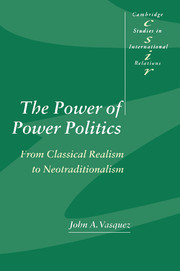Book contents
- Frontmatter
- Contents
- List of figures
- List of tables
- Preface
- Introduction
- Part I The Original Text: Classical Realism and Quantitative International Politics
- Preface to Part I
- Acknowledgments
- 1 The role of paradigms in scientific inquiry: a conceptual framework and a set of principles for paradigm evaluation
- 2 The role of the realist paradigm in the development of a scientific study of international relations
- 3 Research design: defining and operationalizing the realist paradigm
- 4 Theory construction as a paradigm-directed activity
- 5 Data making as a paradigm-directed activity
- 6 Research as a paradigm-directed activity
- 7 Evaluation: the adequacy of the realist paradigm
- 8 Theory and research in the 1970s: the emerging anomalies
- Part II Neorealism and Neotraditionalism: International Relations Theory at the Millennium
- References
- Name index
- Subject index
- CAMBRIDGE STUDIES IN INTERNATIONAL RELATIONS
5 - Data making as a paradigm-directed activity
Published online by Cambridge University Press: 22 September 2009
- Frontmatter
- Contents
- List of figures
- List of tables
- Preface
- Introduction
- Part I The Original Text: Classical Realism and Quantitative International Politics
- Preface to Part I
- Acknowledgments
- 1 The role of paradigms in scientific inquiry: a conceptual framework and a set of principles for paradigm evaluation
- 2 The role of the realist paradigm in the development of a scientific study of international relations
- 3 Research design: defining and operationalizing the realist paradigm
- 4 Theory construction as a paradigm-directed activity
- 5 Data making as a paradigm-directed activity
- 6 Research as a paradigm-directed activity
- 7 Evaluation: the adequacy of the realist paradigm
- 8 Theory and research in the 1970s: the emerging anomalies
- Part II Neorealism and Neotraditionalism: International Relations Theory at the Millennium
- References
- Name index
- Subject index
- CAMBRIDGE STUDIES IN INTERNATIONAL RELATIONS
Summary
The proposition
Kuhn's analysis
Kuhn (1970a: ch. 3) explicitly states that fact gathering (i.e., data making) in normal science is guided by the dominant paradigm in the field; such guidance is necessary because the world consists of numerous phenomena, and phenomena only take on meaning to the extent that they are conceptualized. Conceptualization, as pointed out earlier, is a function of theory construction or paradigm articulation. Facts, then, presuppose a paradigm that sifts through the welter of phenomena to focus on what is important. In the pre-paradigm stage of science, fact gathering tends to be random because there is no single paradigm to distinguish the chaff from the wheat (Kuhn 1970a: 16–17). In normal science, however, fact gathering becomes highly directed, not only because the paradigm focuses on certain phenomena, but because fact gathering usually “consumes much time, equipment, and money” (Kuhn 1970a: 25). Consequently, the gathering of facts becomes a highly selective activity.
According to Kuhn (1970a: 25–27), three types of facts are gathered. The first consists of those that the paradigm has shown to be of great importance for revealing the nature of things. The second, which is a smaller set, consists of those facts that, although they are not intrinsically important, can be used to test certain predictions from paradigm theory. Finally, the third class of facts, which Kuhn considers most important, consists of those facts that were not originally central to the paradigm but subsequently become important because of paradigm articulation.
- Type
- Chapter
- Information
- The Power of Power PoliticsFrom Classical Realism to Neotraditionalism, pp. 77 - 103Publisher: Cambridge University PressPrint publication year: 1999

